The willowy Harris Reed stands 6ft 4in, with a long mane of red hair. Even in a fashion industry chock-full of eccentric, glamorous personalities, Reed is unique. The family photos in his debut book, Fluid: A Fashion Revolution, reveal that fashion fortune and fame were seemingly predestined early on. In stiletto-heeled, thigh-high boots, lipstick and lashings of mascara, the nine-year-old Reed was already both an anomaly and a pre-teen, self-made superstar. Nearly two decades later, those formative explorations in fashion and going against the (gender) grain are borne out in his professional roles.
More like this:
– Iconic portraits of glamorous stars
– The return of a divisive lingerie brand
– How the ‘beauty of fluidity’ went mainstream
“‘Fluid’ is a wonderful word,” he writes at the beginning of his book. “For me, fluidity encompasses both gender expression and gender identity. It can be one of the other, or it can be neither… What you wear can reflect the way you want to be seen by the world. Just because you are a man wearing a suit in the day doesn’t mean you can’t be a man wearing a dress at night.”
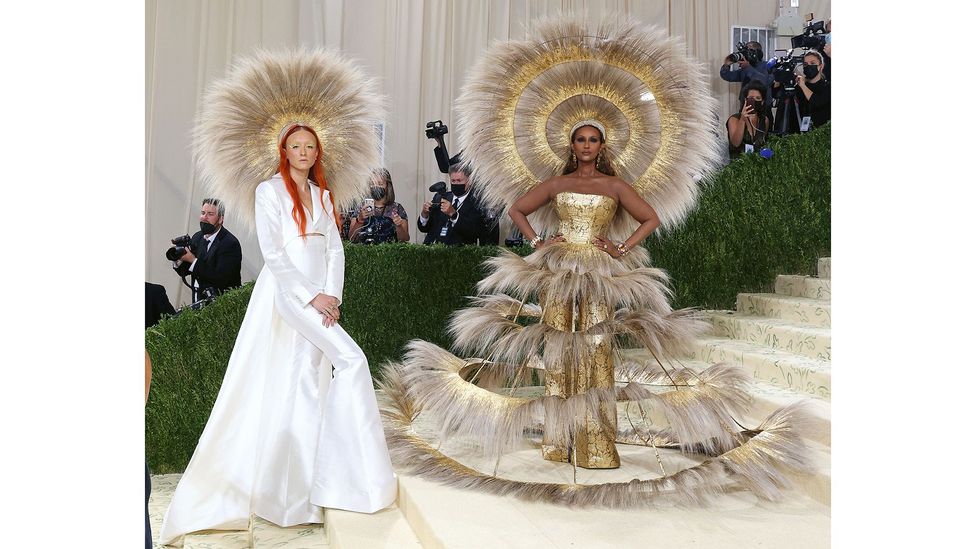
Harris Reed (left) created a spectacular outfit for supermodel Iman for the 2021 Met Gala (Credit: Getty Images)
At Tate Modern last autumn, the British-American designer revealed his glamorous, gender-fluid Duet collection, which kicked off 2023’s London Fashion Week. Duet was a study of contrasts in oversized, curvaceous silhouettes, couture-style embellishments, bared shoulders and nipped-in waists. The only thing tame about Reed’s collection was its pared-back palette of black, white and touches of Champagne gold. Like Reed the person, the collection was a study in Romanticism and old Hollywood glamour that – on closer inspection – is intricate in its subversion of traditional male and female fashion details. Bows that seemed feminine and lush from afar are actually rigid and tailored, much like Savile Row jackets; soaring, wing-like shoulder silhouettes might equally serve to hide breasts, expose a long neck or emphasise muscular shoulders.
Fundamentally, Duet pieces could be worn by men, women, trans and non-binary people. This is Reed’s : gender-fluid fashion that is unafraid to embrace traditional tropes of feminine and masculine. Harris Reed designs – for his own label and for Nina Ricci, where he is now creative director – are eye-popping, artistic, and celebratory of the body and of of sexuality.
On the morning we speak, Reed is in the London apartment that he shares with husband Eitan Senerman, surrounded by moving boxes as he awaits renovations to be completed on the couple’s new home. He is dressed in a black tuxedo jacket, shirtless, and habitually twisting the ends of his long, auburn hair around his fingers as he talks. His speech is rapid, passionate and unguarded. This is, he admits, why he entrusted writer Josh Young to translate his lengthy voice recordings to create the final manuscript of Fluid.
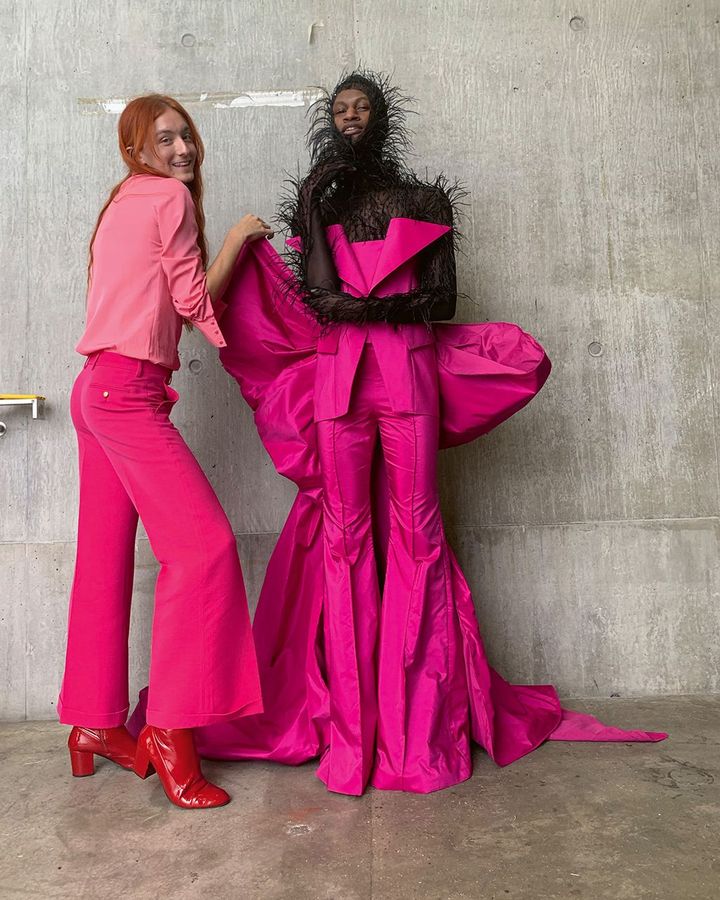
Harris at Central Saint Martins, London – where he studied fashion – with model Trey Gaskin (Credit: Harris Reed)
He recalls the invitation from Abrams books arriving in his email during a staff meeting. The publisher was asking Reed if he might want to write a book. “I was writing back, saying ‘thank you, we’ll do this in 30 years when I’m, like, Tom Ford’. Then my whole team was saying, ‘What are you talking about?’.”
Once committed, he used the two-hour, twice-weekly Eurostar commutes between home in London and the Nina Ricci office in Paris to dictate lengthy chapters of his book, later working with Young to revise the manuscript.
“I thought I would do the Met Gala when I was in my 50s, but I did it at 25. I thought I’d be a creative director in my 50s or 60s, but I did that at 26. So, I’ve kind of loved to just completely push back on my own expectations. I knew I wanted to be in this industry since I came out of the womb. I decided early on that I’m going to do anything and everything.”
By the time he was appointed – at the age of just 26 – the creative director of 91-year-old French fashion house Nina Ricci in September 2022, he had already racked up an enviable number of achievements. Los Angeles-born, Arizona-raised Reed had moved to London in 2017 to study fashion design (he graduated from Central Saint Martins in 2020), but even as a student, Reed’s ambiguous, theatrical clothes had attracted the attention of Harry Styles. Hours after posting his first college project to Instagram, a white bustier, flared trousers and enormous matching hat, Reed received a message from stylist Harry Lambert. Lambert wanted to dress Styles in the outfit for a fashion shoot. Within days, Reed had been engaged to design Styles’s world tour stage costumes over 2017 and 2018.
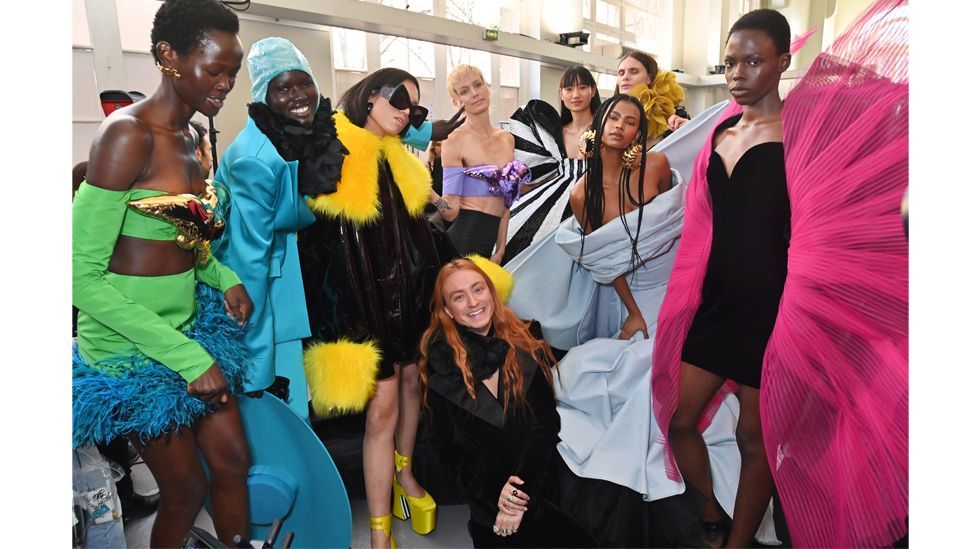
Reed poses with models backstage at the Nina Ricci autumn/winter 2023-24 show in Paris – he was made creative director of the fashion house at the age of 26 (Credit: Getty)
When Styles became the first male cover star of Vogue US in December 2020, he wore a custom Harris Reed outfit that combined tailoring with Romantic-era frou-frou. High-waisted, bell-bottomed trousers, an over-sized, hooped skirt adorned with fuchsia satin and pastel-pink tulle, and a sharp-shouldered jacket with deep V-neck lapels. The extraordinary silhouettes resemble a matador inspired by Ziggy Stardust (Matador Glam?).
“Harry Lambert has been my guardian angel since he spotted me at Central Saint Martin’s,” Reed tells BBC Culture. “Both Harry Lambert and Harry Styles are the warmest, kindest human beings. I’ve done Harry’s tours, the Vogue spread, and music videos. It’s so incredible to have an international recording artist believe in what I stand for. They are both people I love so dearly, I can’t imagine being here without the love of both Harrys.”
Statement dressing
Like Styles, Reed’s fashion fans wear his designs for the camera-attracting, Instagram-worthy statement they make. Think of Shania Twain’s sparkling, bell-bottomed suit at The Grammys, Lil Nas X’s VMA look in 2022, Iman’s incredible tiered, feathered gown and extraordinary headpiece at the Met Gala in 2021, and Beyoncé’s futuristic disco look for British Vogue. Then, there’s his work for Nina Ricci, including Adele’s custom-made black velvet gown for her Las Vegas shows.
“When I got the call about dressing Adele, I thought of the soulful music and the glamorous images of her, and I was worried she might be a diva. When I met her, she was so truly the warmest, giggliest, most real human being. During fittings she was humming her music, and I had just launched my own jewellery line, so I was nervous to ask her to wear it, but she poured it all over her ears and fingers. Extraordinary!”
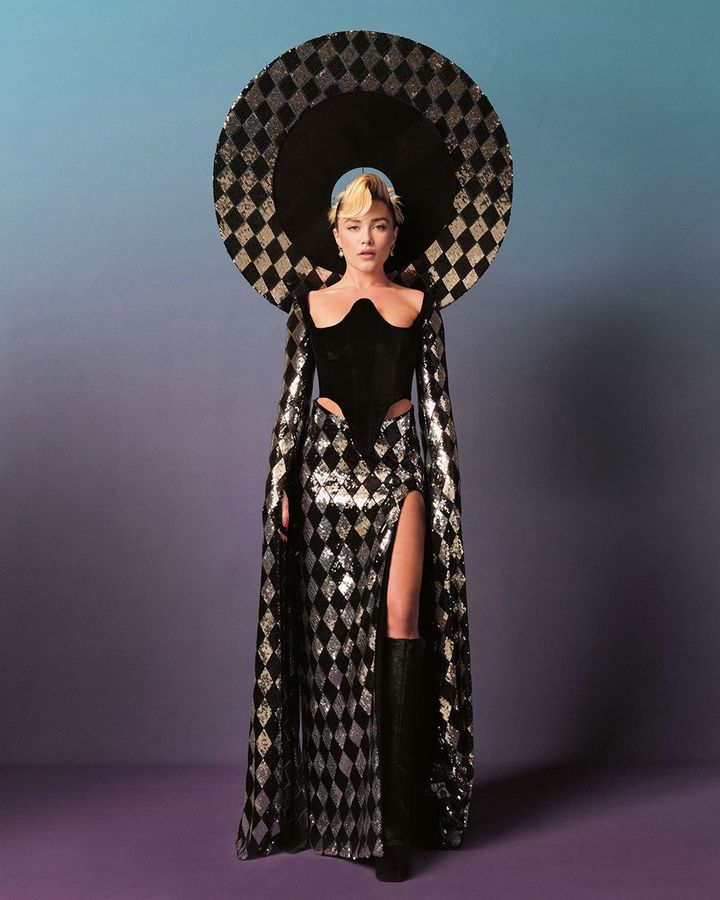
Florence Pugh – pictured wearing a Reed creation – is one of the designer’s many celebrity fans (Credit: Marc Hibbert/ Art World)
Reed adds, “Working with this calibre of women and men can mean there’s a whole entourage of stylists, publicists and managers and everyone has an opinion. What I love about Adele is that it ultimately comes down to her opinion, and it’s the same with Beyoncé and Harry Styles. When I’m designing, that is crucial.”
He adds, “We just did Nicki Minaj, and that was such a genuine connection, it was not calculated or decided by management. The design was Nicki and her stylist’s decision, and she was down to do bold!” For the cover of Minaj’s Pink Friday 2 album, she wore a custom Harris Reed couture gown.
“My favourite thing is big fashion risks,” says Reed. “Nicki Minaj, Adele, all those editorials and albums: that’s the dream. You need a risk-taker to go to those fabulous extremes.”
Those fabulous extremes are a hard-won, hard-earned prize for Reed. As a child, he had already been labelled “gay” by neighbours and the parents of schoolfriends, before it had even occurred to the young Reed to label his gender or sexuality. Wearing nail polish and boasting a generous, pre-Raphaelite tumble of red hair ensured that the pre-teen became accustomed to attention – both admiring and aggressive. Persistent schoolyard bullying led his mother to move the family back to Los Angeles when Reed was 11.
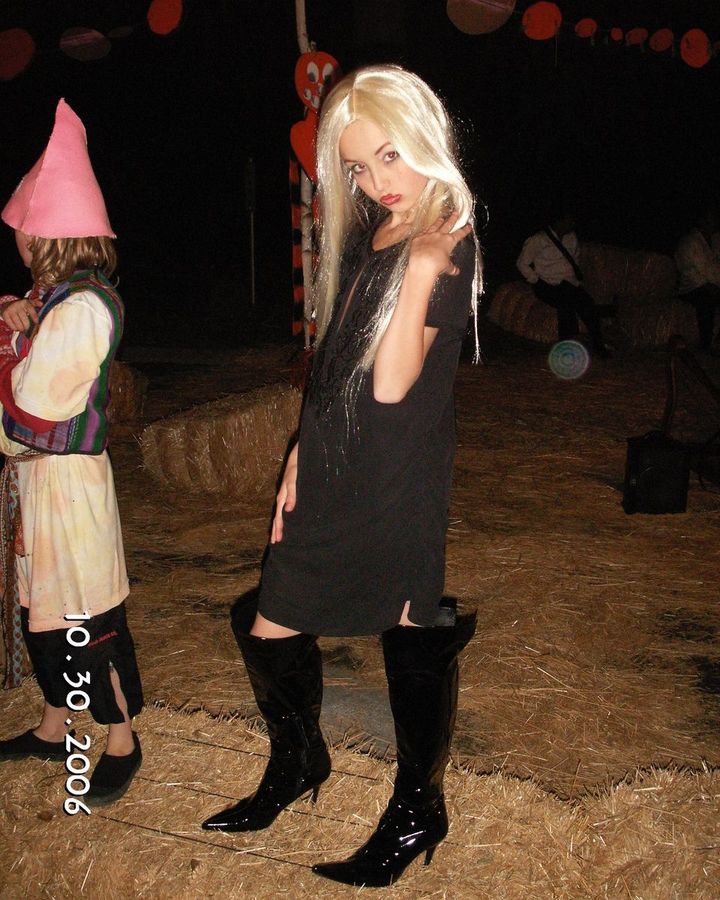
In a family snap taken by his father, the nine-year-old Harris channels Donatella Versace for a Halloween party (Credit: Nick Reed)
The role of adults in labelling him gay as a child, when he hadn’t even considered it yet, is still a sore point for Reed. “That’s something that has really bothered me to my core,” he says. “Not just for myself, but for other young individuals that are not fitting the status quo. I think it’s insane that we live in a world where someone who is well over the age of 18 feels like they have the permission to tell a malleable child what they are. So, because I was maybe a bit more feminine, or I wore rhinestones and dresses, that immediately meant that you were gay. I was nine years old, so I wasn’t even thinking about anything sexual, you know?”
Reed does not seem angry as he reflects on this. It is perhaps this calm temperament that helps explain how he is such a successful leader while still only in his 20s. During our chat, even as his team urgently text him about a problematic delivery of fabric that may halt his entire next collection, he casually texts back that it will be fine, and he’ll take care of it. He is determined to carry on our interview.
“The way I was treated as a child is the reason that I am the way I am now, in the sense that I was like – excuse my language – ‘Fuck all of you, I’m reclaiming who I am. going to figure out who I am! I’m going to break the boundaries down of what I think gender is’. My whole understanding is that no one can tell you your story, you are the author of your own story.”
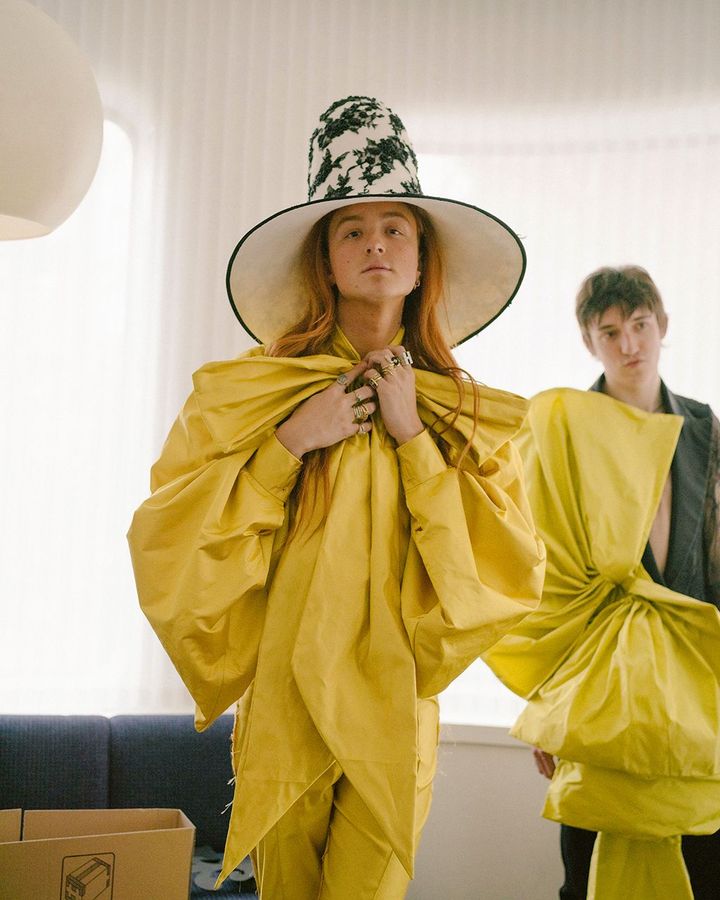
Reed is known for his exaggerated silhouettes and Romantic influences (Credit: Buster Grey-Young)
While his mother is Mexican-American, and his accent is Californian to the core, for Reed, London is very much home.
“I feel much more British than American. My father is British, and England is home for me, it’s a place I love so dearly. If I think of coming home, it’s London. My friends are all here. It’s the most incredible international city. “One month after Duet debuted in September, Reed wed husband Eitan Senerman. The two met on a dating app mid-pandemic in 2021, allowing them small windows of time between lockdowns to go on dinner dates. Senerman (founder and CEO of Spatial Innovation Lab) and Reed wed at Chelsea Old Town Hall, followed by dinner with their guests at Claridge’s.
“I’d be lying if I said marriage is easy and perfect. It takes so much effort and love. It is amazing when I’m on a late train, or on set, or I have a cold and I’m really beat, to look at my hand, see my engagement ring, and I know there’s someone that’s there for me, who has my back. We live between New York, LA, Paris and London, so when we got married, I knew this was someone who’d allow me to spread my wings but not fly too close to the sun and burn out.”
Just as London, marriage and risk-taking celebrity clients have given Reed the sense of accomplishment and home that he craved as a bullied child, he hopes that Fluid: A Fashion Revolution gives an assurance to young people who take it off the bookshelf, and see images of Reed as a child through to the present day.
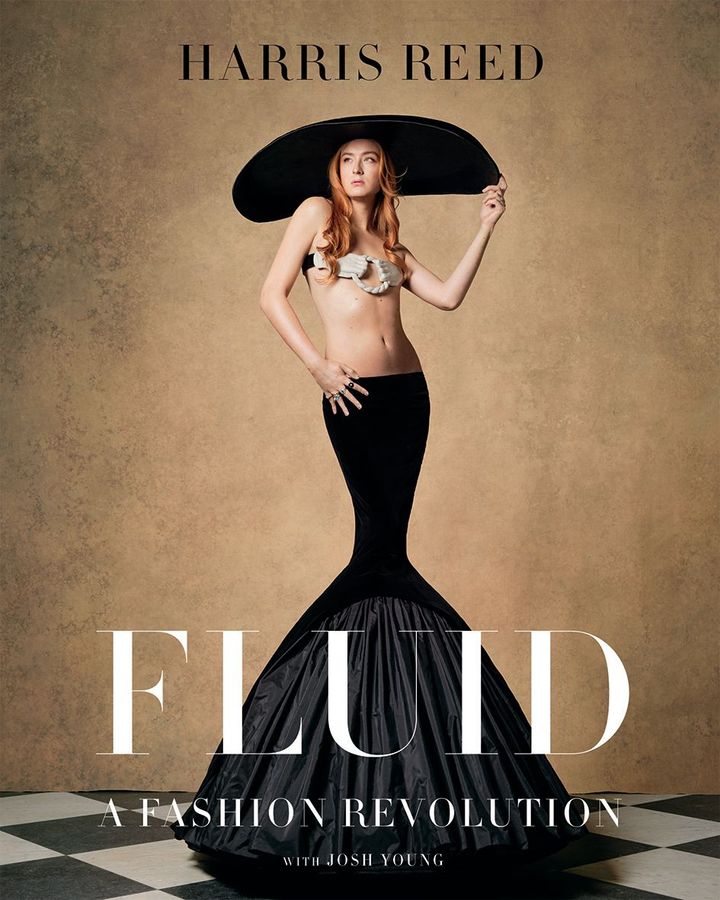
Harris Reed’s memoir, written with Josh Young, explores his journey from childhood to fashion star (Credit: Hardie Grant)
“Those images of me as a child, I feel like they symbolise so much joy – in how I’m moving, sashaying, wearing the platinum-haired wigs and makeup. Those images trigger a time in my life in which, if the camera zoomed out, the environment I was in was one where I didn’t feel I could be me. Those images open the wound, but they are so defining in my queer journey and my fashion career journey.
“In the fashion industry, we want to show up as adults being fabulously perfect, and we don’t go back to share our journey. I wanted this book to be aspirational, for people to pick it up and relate to it.” He concludes, “I didn’t want it to be a glossy, glossy fashion book. The substance had to be there. If I’m only ever making pretty things, then I’m done.”